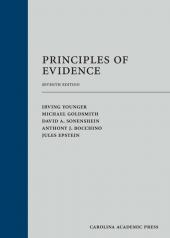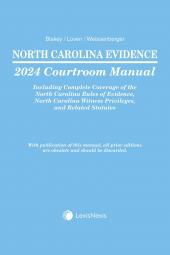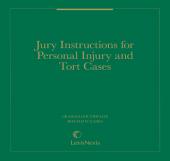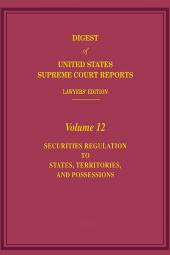Principles of Evidence
Select subscription type
Terms & conditions
Subscribers receive the product(s) listed on the Order Form and any Updates made available during the annual subscription period. Shipping and handling fees are not included in the annual price.
Subscribers are advised of the number of Updates that were made to the particular publication the prior year. The number of Updates may vary due to developments in the law and other publishing issues, but subscribers may use this as a rough estimate of future shipments. Subscribers may call Customer Support at 800-833-9844 for additional information.
Subscribers may cancel this subscription by: calling Customer Support at 800-833-9844; emailing customer.support@lexisnexis.com; or returning the invoice marked "CANCEL".
If subscribers cancel within 30 days after the product is ordered or received and return the product at their expense, then they will receive a full credit of the price for the annual subscription.
If subscribers cancel between 31 and 60 days after the invoice date and return the product at their expense, then they will receive a 5/6th credit of the price for the annual subscription. No credit will be given for cancellations more than 60 days after the invoice date. To receive any credit, subscriber must return all product(s) shipped during the year at their expense within the applicable cancellation period listed above.
Subscribers receive the product(s) listed on the Order Form and any Updates made available during the annual subscription period. Shipping and handling fees are not included in the annual price.
Subscribers are advised of the number of Updates that were made to the particular publication the prior year. The number of Updates may vary due to developments in the law and other publishing issues, but subscribers may use this as a rough estimate of future shipments. Subscribers may call Customer Support at 800-833-9844 for additional information.
Subscribers may cancel this subscription by: calling Customer Support at 800-833-9844; emailing customer.support@lexisnexis.com; or returning the invoice marked 'CANCEL'.
If subscribers cancel within 30 days after the product is ordered or received and return the product at their expense, then they will receive a full credit of the price for the annual subscription.
If subscribers cancel between 31 and 60 days after the invoice date and return the product at their expense, then they will receive a 5/6th credit of the price for the annual subscription. No credit will be given for cancellations more than 60 days after the invoice date. To receive any credit, subscriber must return all product(s) shipped during the year at their expense within the applicable cancellation period listed above.
Product description
To purchase a printed version of this title, please visit www.caplaw.com.
This edition of Principles of Evidence, dedicated to Professor Irving Younger, honors his teaching philosophy, considered revolutionary at first inception. Younger was a great believer that the law of evidence was best learned in the context in which it was applied. Focusing on the Federal Rules of Evidence, this edition has modernized Younger's materials with new and easily taught cases together with an opportunity to consider the law in a practice situation. Every substantive chapter has a Practice Dimension, which contains a Practice Law Review summarizing the law for quick reference; Tactical and Practical Considerations impacting the choice to utilize such evidence and the receptiveness of the judge to such proffers; and Problems and Questions that require students to apply the law to real world situations. This volume is accompanied by a teacher's manual stating the focus of cases and application and use of the Practice Dimension materials.
epub is protected by Adobe DRM.
eBooks, CDs, downloadable content, and software purchases are noncancelable, nonrefundable and nonreturnable. Click here for more information about LexisNexis eBooks. The eBook versions of this title may feature links to Lexis+® for further legal research options. A valid subscription to Lexis+® is required to access this content.
Table of contents
Chapter I INTRODUCTION: THE CONCEPT OF EVIDENCE
Chapter II PRELIMINARY MATTERS
A. ALTERNATIVES TO FORMAL PROOF
B. TYPES OF FORMAL PROOF
C. BASIC CONDITIONS OF ADMISSIBILITY
D. PRELIMINARY QUESTIONS OF FACT: THE ROLE OF JUDGE AND JURY
E. AUTHENTICATION OF DOCUMENTS-ELECTRONIC EVIDENCE
Chapter III THE EXAMINATION OF WITNESSES
A. TESTIMONIAL COMPETENCE
B. INTERROGATION OF WITNESSES
C. RELIANCE ON INADMISSIBLE DATA
D. IMPEACHMENT, CROSS-EXAMINATION, AND RELATED PROBLEMS
Chapter IV RELEVANCY REFINED
A. MATHEMATICAL PROOF
B. SUBSTANTIVE CHARACTER EVIDENCE
C. OTHER EXAMPLES OF LEGAL RELEVANCE
Chapter V THE HEARSAY RULES
A. THE RULE AGAINST HEARSAY
B. RATIONALE FOR THE RULE
C. DEFINING HEARSAY-BASIC CONCEPTS
D. THE APPLICATION OF BASIC CONCEPTS
E. CONDUCT AND IMPLIED STATEMENTS
F. DEFINING THE HEARSAY DECLARANT
G. NON-HEARSAY STATEMENTS ADMISSIBLE FOR THEIR TRUTH
H. EXCEPTIONS TO THE RULE AGAINST HEARSAY
I. CONFRONTATION AND HEARSAY
Chapter VI PRIVILEGES
A. INTRODUCTION
B. THE EXECUTIVE PRIVILEGES
C. THE ATTORNEY-CLIENT PRIVILEGE
D. THE PRIVILEGE FOR MARITAL COMMUNICATIONS
E. THE PHYSICIAN-PATIENT PRIVILEGE
F. THE PRIEST-PENITENT PRIVILEGE
G. THE NEWSGATHER'S PRIVILEGE
Chapter VII BURDENS AND PRESUMPTIONS
 Lexis Nexis
Lexis Nexis 



